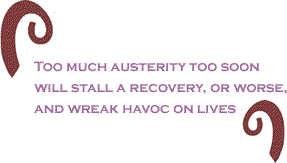The economic elites on both sides of the
Atlantic have suddenly seen their
plans for the future run into a volatile foe: democracy.
I say sudden because who would have thought, say five
years ago, that an aroused popular will would be shaking
the foundations of the political order from Los
Angeles to Bucharest?
Said elites do have plans. They are intent on - amongst
other things - using the current economic crisis to dive
down wages, curtail public spending on things like healthcare
and education, compel people to work more years before
retirement and reduce social benefits available to the
elderly and the poor. It�s been called the Berlin Consensus,
which University of Missouri law and economics professor,
William K. Black, writes rests on �austerity today, austerity
tomorrow, austerity always� and is �a road map to ever
greater inequality.�
Then, along came Occupy and the mass protests
in the streets of Europe calling
attention to the gross inequalities the system has already
produced. Now this year, resistance to the cutback schemes
began to take the form of protest at the ballot box.
�Europe is experiencing
a process of political renewal.� the editors of the Financial
Times declared last Friday. �Voters in Greece,
Italy and, to a lesser extent, France, are understandably
turning away from a disconnected political class and looking
for those offering new ideas and solutions. This sentiment
is acute among the young, whose opportunities have been
damaged by the crisis and feel particularly excluded from
political discourse.�
At the moment there is dismay and consternation
in European political circles, particularly in Germany where government policies
have been most in tune to the interest of the big banks
and other multi-national financial institutions. For months
now, we have been told repeatedly that the political conflicts
on the continent were characterized German resentment
toward the neighboring nations to the south which were
viewed as irresponsible and undeserving supplicants. Then
came Sunday�s election in state of North Rhine Westphalia,
which includes the cities of Cologne,
D�sseldorf, Essen, and the industrial
Ruhr region. There, German Chancellor
Angela Merkel�s Christian Democrats (CDU) suffered a humiliating
electoral defeat. At once it became clear that the program
of economic austerity her government has attempted to
foist off on less-well-off European countries won�t fly
too well at home as well. Merkel �will face a harder time
securing backing for her austerity policy at home, at
a time when resistance to it is building across Europe,�
said Der Spiegel.

�While CDU politicians sought to label
the SPD-Green government as irresponsibly profligate,
calling it �pro debt�, campaigners for the coalition made
a point of holding election rallies in disused swimming
pools and derelict recreation facilities to emphasize
the result of decades of under-investment and neglect
in the state, which suffers from high unemployment and
declining industry,� wrote Kate Connolly in the Guardian.
�Rejecting the conservatives� hard-line
platform of more austerity and finger-pointing, German
voters instead voted for the Social Democrats, for a platform
of more spending and, shockingly, for more debt,� wrote
Robin Wells in the Guardian Monday. �This caps
a series of defeats in state elections for Merkel and
makes it increasingly clear that her government is in
serious jeopardy.�
Meanwhile, across the continent the democratic
revolt continues in earnest. In Poland,
the Solidarity union and other labor organizations are
threatening to cause havoc at the European football championships
next month in Warsaw to protest a government decision to push the retirement age
up to 67 years. Last week, as the parliament was voting
to approve the measure, demonstrators rallied outside
the building blocking traffic. News reports say they set
fire to pictures of government officials and a huge Prime
Minister Donald Tusk in effigy. Voter sentiment continues
to move leftward in The Netherlands and also in Sweden
where Ewald Engelen, a professor of financial geography
at the University of Amsterdam, told the Financial
Times, �The lower-educated, more vulnerable parts
of the electorate are sensing that these austerity policies
are breaking down the last bulwarks that protect them
from globalization, all in the name of saving the euro.�
Meanwhile, Ireland�s May 31 referendum
on the EU fiscal treaty could well be an important indication
of the democratic response to austerity there as well.
 �The
recent election results in France
and Greece
are a massive blow against the failed policies of austerity
in Ireland
and across Europe,� says Sinn Fein�s
deputy leader Mary Lou McDonald. ��A "no" vote
in Ireland on 31 May will strengthen the hand of
all those arguing for jobs and growth.�
�The
recent election results in France
and Greece
are a massive blow against the failed policies of austerity
in Ireland
and across Europe,� says Sinn Fein�s
deputy leader Mary Lou McDonald. ��A "no" vote
in Ireland on 31 May will strengthen the hand of
all those arguing for jobs and growth.�
�Sunday�s regional German elections offer
a small ray of hope. Merkel�s party received a thrashing
in North Rhine-Westphalia, home to nearly one in five
Germans,� economist Wells wrote in the Guardian.
�Rejecting the conservatives� hard-line platform of more
austerity and finger-pointing, German voters instead voted
for the Social Democrats, for a platform of more spending
and, shockingly, for more debt. This caps a series of
defeats in state elections for Merkel and makes it increasingly
clear that her government is in serious jeopardy.
�Perhaps, just perhaps, German voters are
waking up. And therein lies the possibility that the euro
can be saved.�
�The next 100 days promise to be the most
important in a generation for Europe,�
wrote columnist Guardian columnist Will Hutton
this week. �Unless Germany
can be persuaded by, primarily, the new French president,
but also by the grim march of events to change tack fast,
there is now a 50/50 chance that euro membership could
be reduced to a cluster of small states around Germany. A series of uncontainable bank runs and
financial collapses could not be handled by the current
structures. The result would be a European depression
from which Britain would not be immune.
It is the one part of the world to which our exports are
currently rising.�
The implications of the European voter
revolt are being noticed here on this side of the pond
as well.
It�s funny how a dramatic political crisis
can focus the mind, how things like the Occupy movement
and the European voters� revolt can shift perception -
even the public expression - of the powers-that-be in
politics and the media. For instance, the editors of the
Los Angeles Times now maintain that they have �long
argued that faster growth is crucial to solving the U.S. budget problems.� Well,
they haven�t actually made that case very forcefully or
urgently. But now, they say it �may� be a �good idea to
mitigate the harsh spending cuts with stronger economic
growth.� Why? Because, �If the political turmoil in Europe
derails the hard-won agreement over a rescue plan for
Greece and other teetering economies, the result could
be an even deeper recession that spreads across the continent,
if not the total collapse of several countries� economies.
Such a turn of events would inflict pain around the world.�
American Prospect publisher Robert recently asked if the fall of French Prime Minister
Nicolas Sarkozy would �help Democrats learn what he never
could?� �Democrats should consider Sarkozy�s fate a cautionary
tale - and a call to action. If they rally around the
cause of growth, jobs, and optimism, the nation will benefit
and they�ll be rewarded at the polls,� he concluded. As
Campaign for America�s Future�s Richard (RJ) Eskow put it,
�When it comes to Democrats these days, you�ve got to
fight for their party against its right.�

�The United
States economy is doing better than
most of Europe. But the austerity debate continues here, too,� said the New
York Times following the French election. �So is there
a warning for House Republicans who have endorsed Representative
Paul Ryan�s draconian budget? And for Mitt Romney, their
party�s presumptive presidential nominee? Controlling
deficits is important, but too much austerity too soon
will stall a recovery, or worse, and wreak havoc on lives.
Europe�s grim growth numbers prove
that. And voters in Europe have figured
it out.�
�There has always been a gap between public
policy and public will, but it just grew astronomically,�
Professor Noam Chomsky writes in his new book Occupy.
�You can see it right now, in fact. Take a look at the
big topic in Washington that everyone concentrates on: the deficit. For the public,
correctly, the deficit is not regarded as much of an issue.
And it isn�t really much of an issue. The issue is joblessness.
There�s a deficit commission but no joblessness commission.
As far as the deficit is concerned, the public has opinions.
Take a look at the polls. The public overwhelmingly supports
higher taxes on the wealthy, which have declined sharply
in this period of stagnation and decline, and the preservation
of limited social benefits.
�The outcome of the deficit commission
is probably going to be the opposite. The Occupy movements
could provide a mass base for trying to avert what amounts
to a dagger pointed at the heart of the country.�

BlackCommentator.com Editorial Board member
Carl Bloice is a writer in San Francisco, a member of the National Coordinating Committee of
the Committees of Correspondence for Democracy and Socialism and formerly worked for
a healthcare union. Click here to contact Mr. Bloice.

